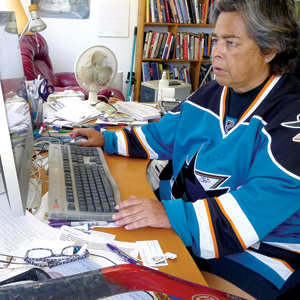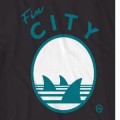Gloria Nieto can still feel the excitement she experienced when attending her first San Jose Sharks game back in 2007. Her cousin, who had season tickets, took her to a Stanley Cup Playoff semi-final match against Nashville. “I was just thrilled with everything,” Nieto recalls. “I was just like, ‘A Zamboni!’”
A lifelong sports fan who passionately follows the San Francisco Giants, Nieto immediately caught Sharks fever. Since then, her family has joined her on the black-and-teal bandwagon, with her mother, sister and brother-in-law purchasing season tickets each year for the past four years. Nieto, who is unemployed at the moment, says she attended as many Sharks games last season as her wallet allowed.
Having worked for years as a gay- and lesbian-rights activist, Nieto was thrilled when her Giants last month became the first professional sports team to join the It Gets Better campaign. This video campaign was launched last year by journalist Dan Savage after national media attention focused on the suicides of LGBT youth.
The Giants video features a number of star players, including pitchers Barry Zito, Matt Cain and Sergio Romo, addressing the difficulty of growing up—especially for gay and lesbian teens: “To all of the kids out there struggling, please know that you have an amazing future in front of you, and an entire community in your corner. … It gets better.”
A few weeks after the Giants video was released, the Chicago Cubs and Boston Red Sox released It Gets Better videos of their own. That’s when Nieto had an idea: Why not get the Sharks to make a video, too?
“The idea of having both my teams doing videos was almost too much to think about,” she says.
While the Major Leaguers’ videos were being released, other professional athletes have been speaking up recently for gay rights. Former Dallas Cowboys player Michael Irvin is on the cover of this month’s Out magazine, which profiled five straight pro athletes “who have stood up for fairness and tolerance, shoulder to shoulder with their LGBT peers.” And last month former New York Giants defensive end Michael Strahan released a video supporting gay marriage in that state.
With so many sports figures finally speaking up for gay rights, Nieto decided to publicly urge the Sharks to become the first NHL team to record an It Gets Better video. She contacted friends on Change.org, a website that promotes social justice campaigns, and launched an online petition.
Nieto has been promoting the petition on Facebook and on a blog she writes for the San Francisco Chronicle. As of this writing, the petition has 180 signatures, and is competing with a similar petition for the Boston Bruins.
Ken Arnold, senior director of communications for the Sharks, says the team is open to participating in the project but there are a couple of obstacles—with the biggest right now being the off-season timing: “I’ve got no players in town,” Arnold says.
Arnold has spoken with Nieto and has held a couple of internal meetings discussing the video idea. Once the players start returning to town in September for training camp, his department can run the concept by a couple of them.
The Sharks are frequently approached and asked to support good causes, from banning shark-fin soup to ending juvenile diabetes, he says, but with limited resources, the team has to choose which to get behind. “It helps from our end of things if a player or two gets behind a certain cause,” he says.
{pagebreak}
Cassie Blume, manager for youth outreach services at the Youth Space of the Billy DeFrank LGBT Community Center, welcomes the video idea.
“The Sharks have so many fans around here,” Blume says. “They are so important, and they’re just down the street from us. So what they do has a huge effect. It would be awesome to see a video from them.”
Blume says it can be difficult for LGBT youth growing up in a “heteronormative” world in which they face assumed gender roles that don’t necessarily fit them.
“When that’s not the case for you, it puts you in a situation where you might be isolated from your peers and from your family and the networks that you need as a person that’s growing,” Blume says.
She was concerned by the sudden media attention surrounding last year’s youth suicides, because she didn’t want the prevalence of suicide to be overstated.
“That’s not who we are,” she says, adding that LGBT youth are “by and large growing up and becoming healthy adults.”
But, she says, “we need to be aware of what the consequences are of not taking care of our youth in schools—of not providing safe environments so they can grow up.”
Blume believes the It Gets Better videos from sports teams make a difference, and not just with LGBT youth.
“When you’ve got these teams that are going to stand up and say that masculinity or being an athlete is not incompatible with being aware of and accepting of LGBT people, then that breaks down a wall or an assumption that a lot of people have held for a really long time.”
Nieto believes that with the Sharks’ numerous youth development programs in the region, recording such a video would send a strong positive message.
“Having community role models come forward is going to have a tremendous impact, I think,” she says. “That’s why I want it to happen. So let’s see what happens.”

 Indigo Girls at Mountain Winery
Indigo Girls at Mountain Winery  Target Summer Pops Music Festival
Target Summer Pops Music Festival 


